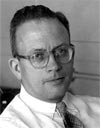 |
| Roger B Loucks |
Professor Roger B. Loucks (1903-1987) received his Ph.D. in Psychology from the University of Minnesota in 1930, and completed further training at Rockefeller University and Johns Hopkins University before joining the faculty at the University of Washington in 1936. He served on the faculty here until his retirement in 1968, interrupted only during World War II when served as Senior Psychologist with the Army and Air Force.
Professor Loucks investigated many aspects of the physiology of learning and memory throughout a long and distinguished career. Among other accomplishments, he developed one of the initial methods for manipulating the electrical activity of the brain of awake, behaving animals and thus helped pave the way for the contemporary study of the brain and behavior, especially as it applies to learning. He was also one of the first scientists in the U.S. to demonstrate unambiguously that Pavlovian conditioning is a genuine phenomenon.
The Roger Loucks Lectureship in the Neurophysiological Bases of Learning and Memory was established by an endowment from the estate of Professor Loucks, and sponsors one or more annual lectures and visits by outstanding scholars who have achieved recognition in the field of Neurophysiological Psychology. The UW Department of Psychology named the Lectureship in honor of Professor Loucks to recognize and pay tribute to an important pioneer in the fields of physiological psychology (now termed behavioral neuroscience) and the neurophysiology of learning and memory.
Previous Roger B. Loucks Lecturers
Carol A. Barnes, University of Arizona
Aging and the Hippocampus: The Good and Bad News
Alcino J. Silva, University of California, Los Angeles
Molecular and Cellular Cognition: Unraveling the Mechanisms of Memory
Richard Thompson, University of Southern California
In Search of Memory Traces
Claudio V. Mello, Oregon Health and Science University
Mapping Vocal Communication Pathways in Birds with Inducible Gene Expression
Michael M. Merzenich, University of California-San Francisco
Contributions of Brain Learning Mechanisms to Adult & Developmental Disability Genesis: Important Implications for Neurorehabilitation
Helen Neville, University of Oregon
Rewiring the Human Brain: Birth to Three & Beyond
Bermundez-Rattoni, Universidad Nacional Autonoma de Mexico
Cortical Cholinergic Regulation of Memory Formation
Larry R. Squire, VA Medical Center, San Diego
Memory Systems of the Brain
Fernando Nottebohm, Rockefeller University
Neurogenesis & Neuronal Replacement in the Adult Brain
Tim Tully, Cold Spring Harbor Laboratory
Vertical & Horizontal Integration of Genes Involved with Memory
William T. Greenough, University of Illinois, Champaign-Urbana
Cellular Approaches to Memory & Mental Retardation Syndrome
Raymond Kesner, University of Utah
A behavioral analysis of the contribution of the hippocampus and parietal cortex to the processing of information: Interactions and dissociations
Daeyeol Lee, Yale University School of Medicine, Department of Neurobiology
Repeated games and neural basis of decision making
Thomas J. Carew, Center for the Neurobiology of Learning and Memory, University of California
How Time Flies: the Molecular Architecture of Memory
Mark E. Bouton, University of Vermont
Context and memory processes in extinction: Some implications for understanding relapse
Michael S. Fanselow, University of California, Los Angeles
Competition and Compensation in the Circuitry Mediating Contextual Fear
Center for Integrative Neuroscience Symposiums
Keynote Speakers
2013: Flipping the Switch: The Neurobiology of Addition
A. David Redish, University of Minnesota
David Belin, University of Poitiers, France
2012: Functional Aspects of Adult Neurogenesis
Gerd Kempermann, Center of Regenerative Therapies Dresden
Gary Westbrook, Oregon Health & Science University
2011: Learning & Memory: Mechanism, Function, Applications
Richard Morris, University of Edinburgh
Lynn Nadel, University of Arizona
2010: Baby Brains: The Development of Functional Neural Circuits
Marla Feller, University of California, Berkeley
Leah Krubitzer, University of California, Davis
2009: The Neurobiology of Decision & Reward
Barry Richmond, National Institutes of Health
Wolfram Schultz, University of Cambridge